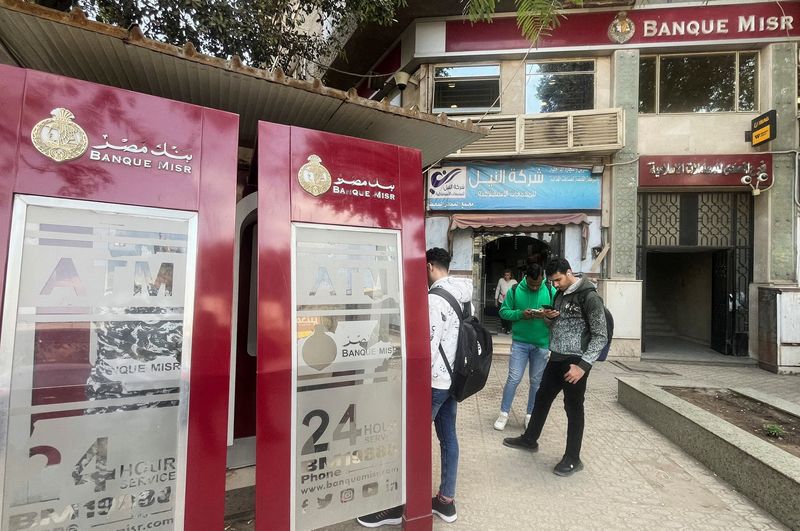
Nafisa Eltahir
CAIRO (Reuters) – The Egyptian pound remained steady on Thursday, a day after the central bank allowed the currency to fall and announced a move to a more flexible exchange rate system as Cairo agreed to an expanded $8 billion program with the International Monetary Fund.
The pound is hovering in the same range of around 49.5 per dollar where it settled at the close of trading on Wednesday, LSEG data showed. Before Wednesday’s virtual devaluation and sharp rise in interest rates, the central bank had held the currency at just under 31 pounds to the dollar for about a year.
A more flexible exchange rate, long a key IMF demand, is seen as crucial to restoring investor confidence in an economy that has been plagued by foreign exchange shortages for the past two years.
The shortage limited local business activity and led to delays at ports and delays in payment for goods.
Prime Minister Mostafa Madbouly said Egypt plans to enter into major deals to ensure liquidity and will work with traders to stabilize prices and prioritize access to foreign currency for importers of essential goods when the currency shift takes effect.
Egypt’s international bonds, which soared on Wednesday and then fell again, fell further on Thursday, with 2033 bonds down 1.62 cents on the dollar to 81.81 cents, according to Tradeweb data.
Overall, Egyptian sovereign bond prices were trading at levels seen in early March.
“ENOUGH AND MORE”
Egypt has in the past promised to move to a more flexible exchange rate system, only to resume holding the currency at a fixed rate while much of the economy depended on the black market rate, which fell to just 70 pounds.
Central bank governor Hassan Abdallah called black market trading a “disease” reflecting a lack of trust in the financial system.
“Fortunately, I can stand here today and say that we have enough funds to meet our obligations and more,” he told reporters at a rare news conference late Wednesday.
The central bank will still have the ability to intervene, as in other countries, if there is excessive volatility, Abdallah said.
The IMF, which agreed to add $5 billion to its existing $3 billion lending program with Egypt, said it was seeking a stable and common exchange rate that would be determined by the market.
As part of the program, Egypt committed to implementing structural reforms to stabilize prices, manage its debt burden and stimulate private sector growth.
Abdallah said Egypt’s interest rates, long among the world’s highest, would now be on a “downward slope” following a 600 basis point hike on Wednesday.
‘IRON FIST’
The devaluation of the pound and the agreement with the IMF came two weeks after Egypt signed an investment agreement with Emirates sovereign wealth fund ADQ that includes a $24 billion payment for rights to develop a key stretch of the Mediterranean coastline.
It also includes converting existing fields worth $11 billion for use in unspecified projects across Egypt. The Egyptian government said the total amount of $35 billion would be transferred within two months.
Since early 2022, as foreign currency shortages worsened, the pound has lost more than two-thirds of its value against the dollar in a series of phased devaluations.
The war in Gaza and attacks on shipping in the Red Sea have threatened revenue from tourism and Suez Canal traffic, two other major sources of hard currency, although officials say tourist numbers rose earlier this year.
Remittances from Egyptians working abroad, the country’s main source of foreign currency, slowed sharply last year amid expectations that the pound would fall.
Madbouly said on Thursday that the Interior Ministry would use an “iron fist” against traders who routed remittances outside the banking system.


